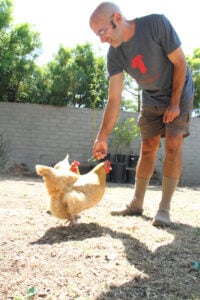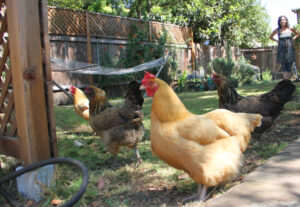SUNSET PARK — Jennifer, Emily, Katherine and Sara snoop around looking for food on the ground in a spacious backyard in Sunset Park that houses four plots brimming with tomatoes, eggplants, peppers and banana trees. All four nip and grab at bits of grass or take turns drinking water from a dish. One of the four even jumps into a tree and clucks around for a bit.
They are all hens that Lisa Sandbank and her husband, Juan Lopez, bought a year ago in an effort to get fresh eggs, live more sustainably and eat locally. Raising and tending to the chickens was easier for them because both work from home in photography, design and marketing.

"We were gardening a lot and it was right as the economy was dying," Sandbank said about their decision to raise chickens. "We started joking about how much we could live off the garden and joked about chickens."
A year ago the couple bought four hens and haven't looked back. Asked about the difference between store bought eggs and eggs from her hen, Sandbank said with a laugh, "that's not even answerable. It's so obvious." Apparently the flavor and texture is far superior.
She and others like her are part of a growing trend in Southern California that hinges on urban farming, or when people grow their own food in urban areas, tend to community and school gardens, and enjoy a sense of satisfaction and security during troubling, economic times. Officials say it's part of wanting to buy local as well knowing where the food set on the table is coming from: Your own backyard.
"Urban chickens are the easiest urban agricultural project in many ways besides growing some vegetables in your backyard," Rachel Surls, Sustainable Food Systems advisor at the University of California Cooperative Extension, said. "Urban chickens are pretty easy. You don't need a lot of equipment, people enjoy them, kids can help, eggs are really easy to use no matter what your cuisine. And I think they're pets for a lot of people."
Surls and a team of graduate students released a report earlier this month called "Cultivate L.A.: An Assessment of Urban Agriculture in L.A. County" that looked at all the zoning codes and municipal policies for cities across Southern California when it came to urban agriculture such as gardening, keeping chickens, bees, horses and more.
In Santa Monica people are allowed to keep 13 fowl of any sort within the city limits, as long as they provide proper shelter and sufficient sustenance.
Surls said some cities put limitations on the number of chickens allowed or how far the chicken coop has to be from the property line. She said often times roosters aren't permitted because they're noisy.
She said urban farming is quite "robust" in Southern California and is a growing trend.
"It's not localized to L.A. This is a movement happening in cities and municipalities around the U.S.," Surls said.
What drives people to take part in urban farming is wanting to know "exactly where their food comes from," said Dean Kubani, director of the Office of Sustainability and the Environment for City Hall.
Kubani said he used to trade eggs his friend had for stuff from his own garden. The Office of Sustainability continues to promote sustainable food by bringing in speakers and doing cooking demonstrations at the Santa Monica Farmers' Market, he said.
"Eating locally is one of the key things people can do to help reduce the impact of their food," Kubani said. "If you can get eggs that are grown in your backyard rather than buying eggs produced in Oklahoma, that's a good thing."
Gas isn't used to transport the eggs and there isn't any packaging involved.
What really clinched it for Sandbank and Lopez was being able to use the chicken poop and egg shells as compost, which was used to fertilize their garden and in turn, allow them to eat the bounty of vegetables.

"It was so cyclical," Sandbank said.
The hens are named after neighbors because the couple thought it would be funny.
"[The neighbors] all said they were delighted and each got each one's first laid eggs," she said.
Sandbank's chickens lay an average of three eggs a day amongst the group. She typically gives most away as gifts, which is fitting since chickens are considered social creatures, said John Lyons, who runs The Woven Garden in Los Angeles, which offers personal customized garden design, maintenance and cultivation.
Lyons suggested having a minimum of three chickens. He works with clients on the Westside, and designs and installs edible gardens and orchards, and has helped set up chicken coops for them.
The birds are supposed to have some indoor and outdoor space, ideally 4 square feet per hen, he said.
"The most important thing is check with your neighbors to see if they have an issue with it," Lyons, who owns 17 chickens, said. "Bribery always works. You can always give them eggs."
Sandbank said the noise issue was one thing she was very conscious about, and she ended up researching what people who lived next to chickens and people who had chickens thought.
"They said there would be noise after they lay their eggs," she said. "It's way more [noise] than I thought."
Surls said for people who want to have chickens, it's important to have the support from the community.
"I think it's really important just to be a good neighbor," Surls said. "If you can be a good neighbor, I think your neighbors will be supportive of having backyard chickens."
ameera@www.smdp.com









